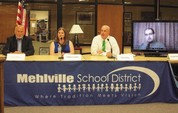Four candidates are seeking two seats on Mehlville board
By Kari Williams
Staff Reporter

Four Mehlville Board of Education candidates answered questions ranging from teacher evaluation and compensation to the Missouri school funding formula during a forum last week.
Candidates for the April 3 school board election are Kathleen Eardley, Ron Fedorchak, Fred Padberg and Mike Wainz. Up for election are seats held by Fedorchak and Tom Diehl, who did not file for re-election.
Fedorchak was appointed to the board to fill a vacancy when former board member Micheal Ocello resigned. Wainz and Fedorchak have been endorsed by the Mehlville National Education Association and South County Labor.
More than 40 people attended the March 12 forum at Oakville Senior High School.
When asked about full-day kindergarten and early childhood education, candidates said they were in favor of both.
Wainz said he is “a big advocate” of full-day kindergarten, in part, because of the socialization aspect.
“If nothing else, just first and second grade when they come back from vacations, they’re going to be better equipped if they’ve had a full-day of kindergarten,” he said.
Though Padberg said all of his children attended Catholic schools, where the cost “rests heavily on (the) shoulders of the people who commit to those wonderful schools,” he supports full-day kindergarten.
“If you can afford kindergarten, that’s wonderful,” he said. “Affording it is the key in my estimation.”
Fedorchak, who voted for in favor of instituting tuition-free, full-day kindergarten for the 2013-2014 school year, said he believes increasing student contact with teachers will help student achievement.
“When I found that under the current funding formula, we would actually have a revenue-positive outcome on (tuition-free, full-day kindergarten), it didn’t make any sense why we haven’t done this,” he said, noting current space and teacher considerations and the uncertainty of the funding formula.
Eardley, who has one child enrolled at John Cary Early Childhood Education Center, said early childhood education is the “building blocks for education,” but state funding is the issue.
“The more time you get into the classroom as a little person, you learn the rules of school and how things operate and how to stand in line and do everything you need to do to function well in school,” she said. “… Really, funding it is the battle and that’s a state-level issue at this moment.”
When asked how they would improve student achievement, answers varied from emphasis on certain curriculum to increased instructional time.
Padberg, who served in the military when he was 18 to 21 years old, said he would like to see emphasis on American history.
“I was in South Korea for a good, long time and those people are so proud of their history, their nationality,” he said. “We have to emphasize that to our young people so they appreciate what we have in this great country and the importance of effort and discipline and hard work, not only in the school system but in their lives afterward.”
Extending the school calendar to meet the national average of 180 days would help improve student achievement, according to Fedorchak.
“We need our kids in front of teachers more, television less,” Fedorchak said.
Eardley said student achievement can be improved with quality teachers.
“It’s really a matter of maintaining (quality teachers) and making sure that all students have contact with teachers that believe in them and their success,” she said.
Wainz said better technology, more emphasis on physical education and more home involvement can help improve student achievement.
When asked for a measurement of standard for evaluating and rewarding good, effective teachers in terms of compensation, opinions varied.
Fedorchak said merit teaching could be tied to overall performance and evaluations could be done by grade or school building for merit increases.
He said he would like to see a “building-based or grade-based merit system in place for teachers based on the MAP scores, ACT scores and end of class exams.”
However, Eardley said it is “really hard” to judge teachers using standardized tests and there should be a variety of ways to evaluate teachers, such as parent, peer and supervisor evaluations.
“I don’t think merit pay should be based on MAP scores … It’s not a straightforward form of compensation,” she said. “You can’t base an entire year’s worth of teaching on one test score because it doesn’t necessarily demonstrate what’s going on in a classroom.”
Wainz said performance could be based on graduation rates.
“Graduation rates would be one thing I would say and, also, you can get a trend over a three-, four-, five-year period of how students in a certain classroom did as they move on,” he said.
Looking at the results that teachers produce in their classes is a good rule, according to Padberg.
“In the competitive world that we live in, your raises and salaries are determined by your own performance, and how good or not so good you do,” he said. “I think teachers ought to be evaluated the same way.”
Asked if they believed it was appropriate to construct the recently approved auditorium without going back to voters after Proposition C was defeated in 2010, responses were split.
Wainz and Fedorchak said it is appropriate because the funding comes from savings realized by refinancing bond-like certificates.
“I think it worked out all right because it was just a refinancing of the certificates of participation. It didn’t extend the length of term or anything,” Wainz said.
Padberg said if taxpayers are not in agreement, the auditorium should not be built.
“I’m sorry, but these folks are paying heavy tolls in their property taxes year after year, and I am absolutely dead set against imposing additional burdens on these people, many of whom are on fixed incomes and retired folks,” Padberg said. “I’m sorry, but if the money’s not there and the people who are paying the tab say, ‘No,’ you are obligated to listen to them.”
Though Fedorchak said he agrees with Padberg’s premise, the current board member also said the money is available.
“We have cut the budget; we have been good financial stewards. We had a surplus of $1.2 million that the existing board members wanted to put toward buildings and facilities,” Fedorchak said.
Eardley said while the auditorium is good for the district, because voters rejected Prop C, the issue should have gone back to the taxpayers.
“(Taxpayers are) going to foot the bill one way or another,” she said. “So if you’re footing the bill you need to ask before you just go forward and build. It’s a good thing for the district, so it needs to be done, but it needed to have been asked for.”
When asked about the Missouri school funding formula, most candidates spoke of its complexity and the issue of fully funding the formula.
However, Padberg said he would need more information to form an opinion.
“I wish I had an opinion about it because, quite frankly, I need more information to form an opinion,” he said.
Wainz said the formula is both fair and unfair, noting Mehlville receives about 17 percent to 18 percent of its funding from the state, while the neighboring Fox School District receives 45 percent of its funding from the state.
“I’m aware, to a certain extent, of how the funding formula works,” Wainz said. “You’ve got to be individual with it with every district, and that in itself creates kind of a … conundrum with all this.”
Eardley said the formula, in theory, is designed to “level the playing field for districts,” but because it has never been fully funded by the state, it has not done what it is set up to do.
“The way the funding formula works is they take a pool of resources from a state level and distribute it back to districts to try and make it so that all districts are equal,” she said, “and in reality it doesn’t do what it’s intended to do, and Mehlville kind of gets the short end of the stick because most of our tax-base is community, so our tax dollars go to the state, then get redistributed … and not necessarily to our district.”
Noting uncertainty in funding the formula, Fedorchak said the district has built its reserves higher than the amount the board agreed to, which was from 13 percent to 18 percent.
“The problem with whatever way this comes out right now (is) there could be lawsuits from the losing school districts,” he said, “and it’s going to bog down our legislative processes … All we can do here is prepare at Mehlville, and we have done that.”



























